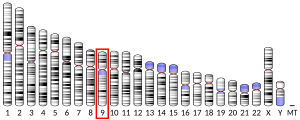IFNW1
Appearance
(Redirected from Interferon omega)
Interferon omega-1 is a protein that in humans is encoded by the IFNW1 gene.[3][4]
References
[edit]- ^ a b c GRCh38: Ensembl release 89: ENSG00000177047 – Ensembl, May 2017
- ^ "Human PubMed Reference:". National Center for Biotechnology Information, U.S. National Library of Medicine.
- ^ Olopade OI, Bohlander SK, Pomykala H, Maltepe E, Van Melle E, Le Beau MM, Diaz MO (Dec 1992). "Mapping of the shortest region of overlap of deletions of the short arm of chromosome 9 associated with human neoplasia". Genomics. 14 (2): 437–43. doi:10.1016/S0888-7543(05)80238-1. PMID 1385305.
- ^ "Entrez Gene: IFNW1 interferon, omega 1".
Further reading
[edit]- Bekisz J, Schmeisser H, Hernandez J, et al. (2005). "Human interferons alpha, beta and omega". Growth Factors. 22 (4): 243–51. doi:10.1080/08977190400000833. PMID 15621727. S2CID 84918367.
- Adolf GR, Frühbeis B, Hauptmann R, et al. (1991). "Human interferon omega 1: isolation of the gene, expression in Chinese hamster ovary cells and characterization of the recombinant protein". Biochim. Biophys. Acta. 1089 (2): 167–74. doi:10.1016/0167-4781(91)90004-6. PMID 1647209.
- Adolf GR, Maurer-Fogy I, Kalsner I, Cantell K (1990). "Purification and characterization of natural human interferon omega 1. Two alternative cleavage sites for the signal peptidase". J. Biol. Chem. 265 (16): 9290–5. doi:10.1016/S0021-9258(19)38846-5. PMID 1693148.
- Flores I, Mariano TM, Pestka S (1991). "Human interferon omega (omega) binds to the alpha/beta receptor". J. Biol. Chem. 266 (30): 19875–7. doi:10.1016/S0021-9258(18)54862-6. PMID 1834641.
- Capon DJ, Shepard HM, Goeddel DV (1985). "Two distinct families of human and bovine interferon-alpha genes are coordinately expressed and encode functional polypeptides". Mol. Cell. Biol. 5 (4): 768–79. doi:10.1128/MCB.5.4.768. PMC 366781. PMID 2985969.
- Hauptmann R, Swetly P (1985). "A novel class of human type I interferons". Nucleic Acids Res. 13 (13): 4739–49. doi:10.1093/nar/13.13.4739. PMC 321823. PMID 3895159.
- Chen YH, Böck G, Vornhagen R, et al. (1994). "HIV-1 gp41 enhances major histocompatibility complex class I and ICAM-1 expression on H9 and U937 cells". Int. Arch. Allergy Immunol. 104 (3): 227–31. doi:10.1159/000236670. PMID 7913356.
- Oritani K, Medina KL, Tomiyama Y, et al. (2000). "Limitin: An interferon-like cytokine that preferentially influences B-lymphocyte precursors". Nat. Med. 6 (6): 659–66. doi:10.1038/76233. PMID 10835682. S2CID 25029188.
- Cicala C, Arthos J, Selig SM, et al. (2002). "HIV envelope induces a cascade of cell signals in non-proliferating target cells that favor virus replication". Proc. Natl. Acad. Sci. U.S.A. 99 (14): 9380–5. Bibcode:2002PNAS...99.9380C. doi:10.1073/pnas.142287999. PMC 123149. PMID 12089333.
- Strausberg RL, Feingold EA, Grouse LH, et al. (2003). "Generation and initial analysis of more than 15,000 full-length human and mouse cDNA sequences". Proc. Natl. Acad. Sci. U.S.A. 99 (26): 16899–903. Bibcode:2002PNAS...9916899M. doi:10.1073/pnas.242603899. PMC 139241. PMID 12477932.
- Zhang Z, Henzel WJ (2005). "Signal peptide prediction based on analysis of experimentally verified cleavage sites". Protein Sci. 13 (10): 2819–24. doi:10.1110/ps.04682504. PMC 2286551. PMID 15340161.
- Gerhard DS, Wagner L, Feingold EA, et al. (2004). "The status, quality, and expansion of the NIH full-length cDNA project: the Mammalian Gene Collection (MGC)". Genome Res. 14 (10B): 2121–7. doi:10.1101/gr.2596504. PMC 528928. PMID 15489334.
External links
[edit]- PDBe-KB provides an overview of all the structure information available in the PDB for Human Interferon omega-1 (IFNW1)

